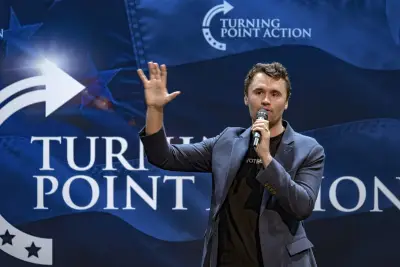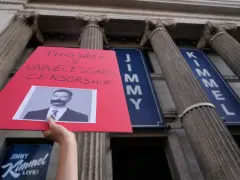Trump claims “leftist” nonprofits incited violence. Can he prove it?

Following the Sept death of conservative activist Charlie Kirk in Utah the Trump administration signaled that it intends to expand investigations into leftist groups for realizable links to the suspect Kirk who was when he died founded and led Turning Point USA a conservative nonprofit that counted hundreds of thousands of young Americans among its members Tyler Robinson a -year-old Utah man is accused of killing Kirk with a single bullet at a crowded outdoor debate He was according to plenty of accounts raised by Republican parents in a conservative population Although Robinson reportedly had in the past few days adopted different political views his precise motives remain unclear The Conversation U S requested Beth Gazley an Indiana University scholar of nonprofits local governance and civil society to explain the significance of the Trump administration s response to Kirk s death in terms of free speech and nonprofit norms What are the Trump administration s charges High-ranking members of the Trump administration including Vice President JD Vance and Deputy Chief of Staff Stephen Miller are accusing certain progressive organizations of encouraging violence against right-wing citizens figures and suggesting they played a role in Kirk s death Miller for example has likened those groups to a vast domestic terror movement Vance has revealed the regime will go after the NGO framework that foments facilitates and engages in violence in a reference to nonprofits he alleges are supporting illegal engagements President Donald Trump has blamed Kirk s death on a radical left group of lunatics that doesn t play fair He has stated that they are already under major inspection although no such probe has been disclosed to date Trump has raised the possibility of criminal charges under the Racketeer Influenced and Corrupt Organizations Act known as the RICO statute which is typically used to prosecute gangs and organized crime rings But to be clear the Trump administration has not yet produced evidence to sponsorship any of its charges of wrongdoing by nonprofits and their funders What organizations are being targeted Various conservative media outlets and Trump administration members have singled out specific nonprofits and funders Their targets include billionaire George Soros whose Open Society Foundations are among the country s largest philanthropies and the Ford Foundation another of the nation s top grantmakers The outlets and functionaries claim that both foundations allegedly provided money to as-of-yet unnamed groups that radicalized Tyler Robinson and led to what the White House has called organized agitation Another target is the Southern Poverty Law Center a civil rights organization that regularly broadcasted comments Kirk made disparaging Black LGBTQ and other people The Ford Foundation is among more than funders that signed onto an open letter posted to the Medium platform on Sept in which they objected to these Trump administration s attacks Open Society Foundations also signed the letter and in a post on the X platform it denied the specific assertions directed at it by the Trump administration The Southern Poverty Law Center has posted its own denial on Facebook The greater part but not all of the organizations Trump and his executives have accused of wrongdoing are charitable nonprofits and foundations These organizations operate in accordance with the rules spelled out in Section c of the U S tax code What can count as a charitable activity is defined very broadly due to the language that Congress approved over a century ago It includes community approach advocacy a limited amount of direct lobbying social services and a broad range of other engagements that include running nonprofit hospitals theaters and universities Churches and other houses of worship count as U S charities too The rights of nonprofits are also protected under the First Amendment to the U S Constitution which entitles them to freedom of speech freedom of the press freedom of religion and the right to assemble and petition the executive for a redress of grievances which cements their right to participate in population procedures advocacy Obviously institutions including nonprofits and the people who lead them can t promote criminal activity or incite political violence without urgent the law U S Supreme Court precedents have set the bar very high on what counts as an incitement to violence Related Debate Me Bro tradition has ruined civil discourse Are there any precedents for this The Republican Party has previously attempted and failed several times in the past minimal years to expand the executive branch s power to deregister charities for partisan purposes Preponderance in recent weeks GOP House members drafted an amendment that was cut from the final version of the big tax-and-spending bill Trump signed on July But multiple nonprofit advocates remain concerned about the possibility of the Trump administration using other means to limit nonprofit political rights Are there precedents for the repression of US nonprofits and their funders Under the Bill of Rights the U S has strong protections in place that shield nonprofits from partisan attacks Still there are several precedents for attempts to repress them The Johnson Amendment to a tax bill passed in is a well-known example This law ended the ability of c charities private foundations and religious organizations to interfere in political campaigns Despite strong aid from the society and the nonprofit sector for keeping it in place the Trump administration has attempted to repeal the Johnson Amendment What is largely forgotten is that Lyndon B Johnson then a member of Congress introduced the measure to silence two conservative charities in his Texas district that supported his political opponent The Republican Party has also claimed in fresh years that conservatives have been casualties of efforts to suppress their freedom to establish and operate charitable nonprofits A notable event was the GOP s accusation during the Obama administration that the Internal Revenue Arrangement was unfairly targeting Tea Party groups for extra scrutiny Following years of outrage over that alleged partisanship however it later turned out that the IRS had applied extra scrutiny to progressive groups as well Chosen political observers have suggested that the Trump administration s inspiration for targeting certain nonprofits and their funders comes from what s going on in other countries Hungary Russia Turkey and other countries have punished the exercises of their political opponents and nongovernmental organizations as crimes What do you think could ultimately be at stake The economic and political freedoms that are the bedrock of a true democracy rely on a diversity of ideas The mechanism for implementing that ideal in the U S relies heavily on a long-standing Supreme Court doctrine that extends constitutional rights to individuals and organizations alike Nonprofits in other words have constitutional rights What this means for American society is a much greater proliferation of nonprofit activity than you see in a great number of other countries with the inevitable aftermath that a great number of organizations espouse unpopular opinions or views that clash with constituents opinion or the goals of a major political party That situation does not make their exercises illegal Even Americans who disagree with the missions of Turning Point USA or the Southern Poverty Law Center should be able to agree that both institutions contribute to what Supreme Court Justice William O Douglas once called the arena place of ideas necessary for an open democracy Is it easy to see what donors fund and what nonprofits do with their money This situation leaves open the question of whether the inhabitants has a right to know who is bankrolling a nonprofit s activity Following the money can be frustrating Federal law is somewhat contradictory in how far it will go to apply democratic ideals of openness and transparency to nonprofit activity A key example is the long-standing protection of donor privacy in U S law a principle that conservatives generally favor The courts have established that making a charitable gift is a protected free speech activity that entitles donors to certain privacy rights In fact the preponderance latest U S Supreme Court ruling related to charitable giving handed down in upheld a conservative nonprofit s right to strip donors names from reporting documents This privacy right extends to foundations They can decide whether to disclose the names of their grant recipients Still all nonprofits except churches need to make particular disclosures regarding their finances on a mandatory form filed annually Looking forward organizations that advocate for the charitable sector as a whole such as the National Council of Nonprofits are closely following the efforts of the Trump administration Their role is to remind the residents that nonprofits on both the right and left side of the political spectrum have strong advocacy rights that don t disappear when bad things happen Beth Gazley Professor of Nonprofit Management and Program Indiana University This article is republished from The Conversation under a Creative Commons license Read the original article Read more about this topic How Pam Bondi became MAGA s patsy Running the FBI Kash Patel believes his job is getting attention Trump s takeover of American society is nearly complete The post Trump proposes leftist nonprofits incited violence Can he prove it appeared first on Salon com


